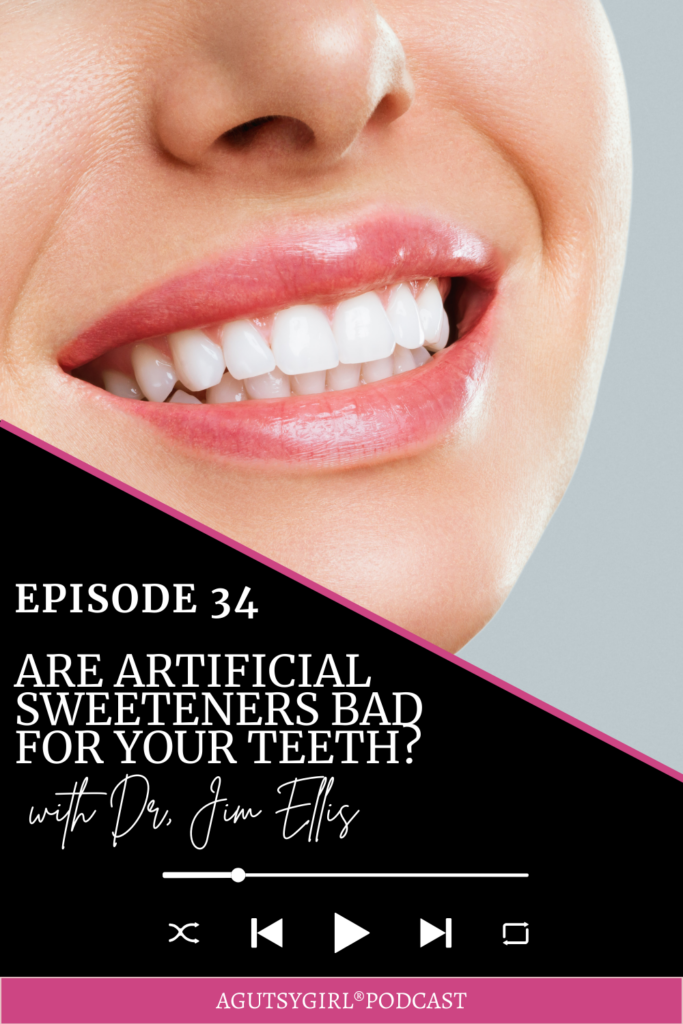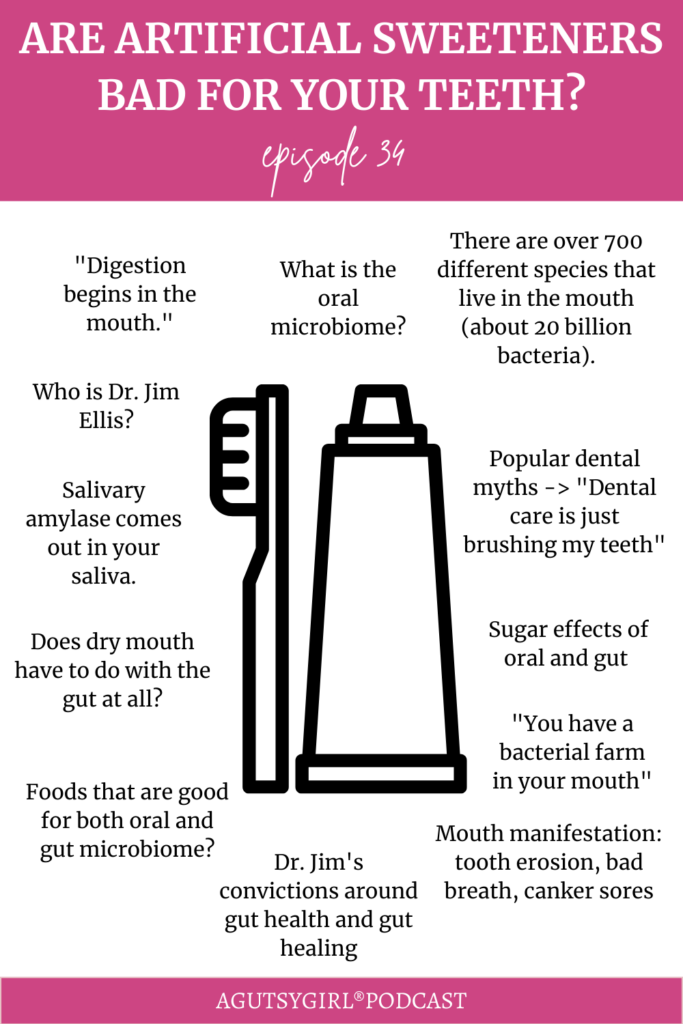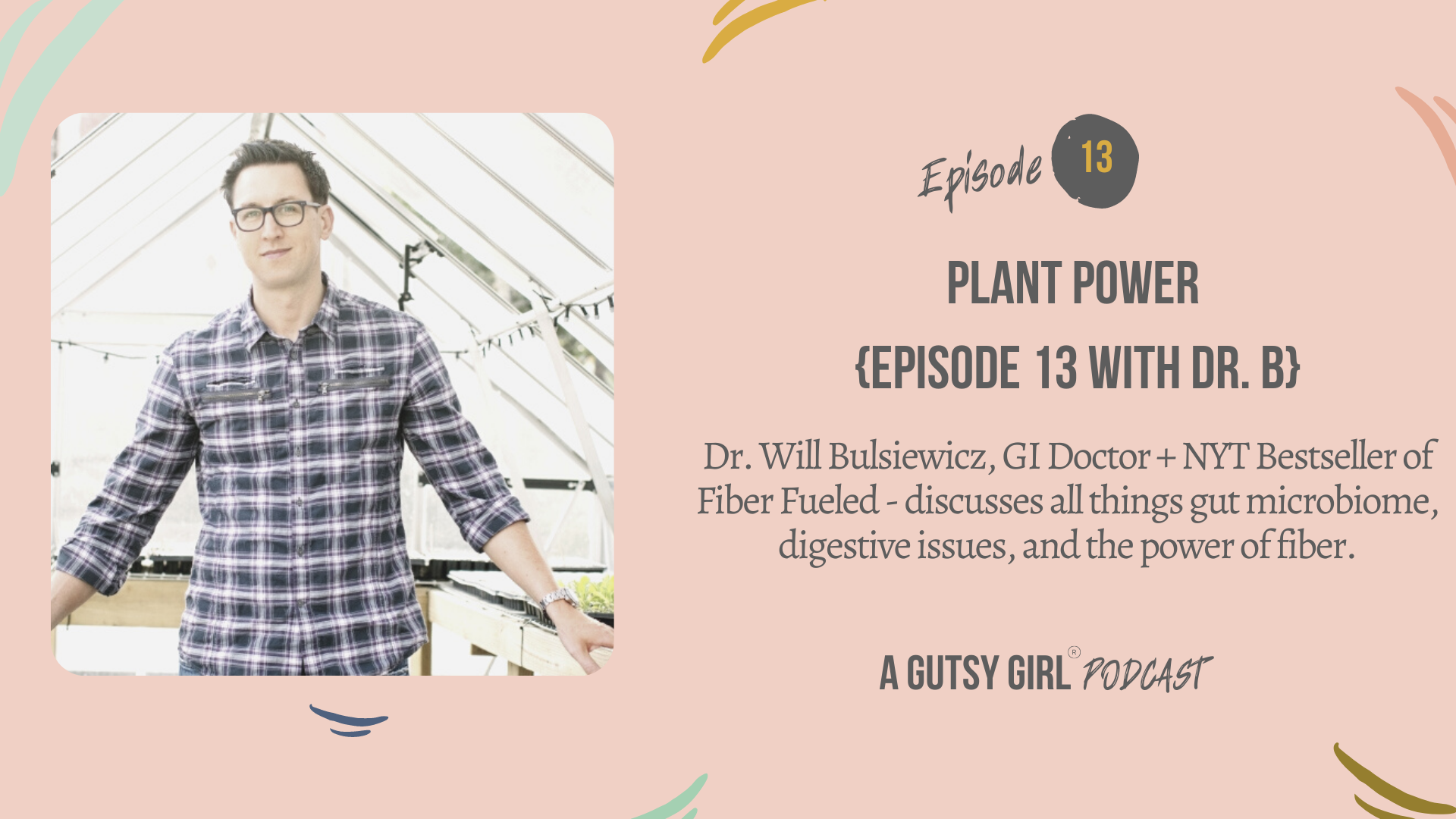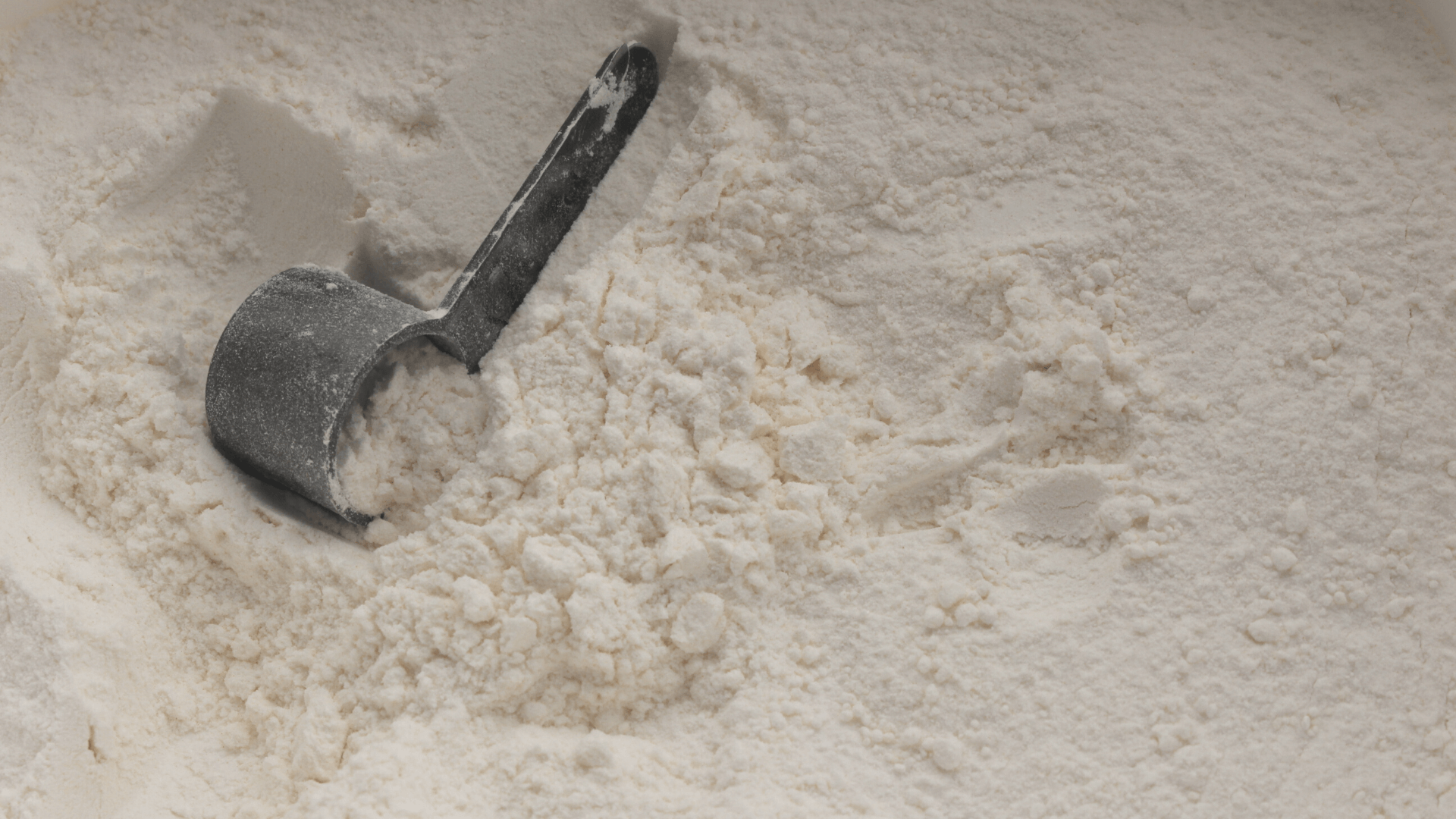On today’s episode, we focus on the oral microbiome, its connection to the gut microbiome, and we’re answering questions like, “Are artificial sweeteners bad for your teeth?”
Obviously we already know they are bad for the gut.
While the gut microbiome is a hot health topic, the oral microbiome is also a topic on the rise.
Listen in to the show now for the dental perspective on the gut and/or find more information below.
Subscribe Today:
Apple Podcasts | Spotify | iHeart Radio | RSS
Are Artificial Sweeteners Bad for Your Teeth? (All Things Oral Microbiome, Episode 34 with Dr. Jim Ellis)
Click HERE to save this episode for later.
Resources Mentioned
- Dr. Jim Ellis website
- His Instagram (theoralcareclub)
- Side Effects of Antibiotics and Rebuilding the Gut
- Probiotic Foods vs Prebiotic Foods
- Psychobiotics {+ 5 other biotics to know}
- Teeth Whitening Strips (Use code: AGUTSYGIRL015 at checkout to save 15%)
Don’t Miss These Thoughts
- Who is Dr. Jim Ellis?
- “Digestion begin in the mouth.” – Dr. Jim
- What exactly is the oral microbiome?
- There are over 700 different species that live in the mouth (about 20 billion bacteria).
- Salivary amylase comes out in your saliva.
- What is the connection between the gut and mouth? And if the gut is off for any reason, what might manifest orally?
- Mouth manifestations: tooth erosion, bad breath, canker sores
- mouth, throat, stomach, intestines
- Does dry mouth have to do with the gut at all?
- Foods that are good for both the oral microbiome and gut microbiome?
- Sugar consumption; effects of sugar from oral and gut standpoint? – “The war of sugar substitutes.”
- Popular dental myths –> “Dental care is just brushing my teeth.”
- “You have a bacterial farm in your mouth.”
- What ingredients should we look out for in toothpastes?
- Dr. Jim’s convictions around gut health and gut healing.

Mouth Journey
As I mention in the beginning of the episode, I have had one very long journey with mouth issues.
While my overall dental health was never a problem and I never had “dental problems,” per se, I had mouth issue after mouth issue that I dealt with.
And here’s the thing about it……I do not have them today. The mouth problems literally and 100% correlated with the gut problems.
I’d love to tell you that I fully figured out why and what happened, but to this day, no true answers were ever found.
What I can tell you are the things I experienced in conjunction with all the gut issues:
- angular cheilitis
- canker sores
- a dry, burning tongue feeling (but the dentists and doctors always said it was not a saliva production problem nor was it dry mouth) – I know; totally confusing
And if you want to read more about this journey, here are some places to check it out:
- My Full Story (I talk about it in podcast episode 1)
- Oral Allergy Syndrome
- White Spots on Tonsils
What are Toxic Dental Products?
Dr. Jim mentions to avoid toxic products with your dental care; be a label reader.
Here are three in particular he mentions during the show:
- SLS (foaming agent)
- Titanium Dioxide (makes things whiter; banned in Europe)
- Fluoride (see below)
Sound familiar with what I teach and preach re. ingredients vs. ingredients(s)?
So, always be sure to read the labels when purchasing the following:
- rinses and breath freshners
- dry mouth products
- toothpastes (p.s. He includes one of my favorite toothpastes in his lineup, and I think he should add another – the Wellnesse Whitening Toothpaste HERE)
Like Dr. Jim’s recommendations and his own line of products, I also adore what Katie (i.e. Wellness Mama) is doing in the oral care space.
Fluoride
Here are some more thoughts on fluoride from Dr. Ellis.
Fluoride can absolutely play a critical role in strengthening teeth. As teeth demineralize, due to acidic conditions in the mouth, calcium and phosphate ions break free from the teeth and become free floating.
Fluoride can re-bond those ions into Fluorapatite that remineralizes the tooth and strengthens them against future acidic attack.
Fluoride, like all other chemicals, can be dangerous if not used in proper quantities and thus I do not advocate for its use in water supplies or in oral care products used by all members of the household regardless of age or situation.
However, if an individual does their own research and finds that properly prescribed doses of fluoride are right for them then I do recommend fluoride as a means of strengthening teeth.
{Click HERE to read more on the great fluoride debate.}
Sugar
Your mouth is full of bacteria — many are beneficial, while others are harmful. The harmful bacteria feed on the sugar you consume and create acids that attack and damage your tooth enamel, the protective, shiny outer layer of your teeth. (source)
In addition, consuming sugar (and other acidic things) typically lowers the pH.
Dr. Ellis says that the goal is to have a neutral pH in the mouth.
If you’re going to do it, consume it and be done with it. Don’t take a sip of your soft drinks every 5 minutes or take a bite of sweet food every 10 minutes. It takes 15 minutes for your saliva to bring your oral cavity back to neutral pH. So if you’re taking a sip every 12-15 minutes, then you might as well just bathe your oral microbiome in sugar all day long for long periods of time.
I’ve discussed at length why sugar intake (namely via added sugars) is not conducive for gut healing. You may even recall a post I wrote long ago on the sugar addiction.
Two hundred years ago, the average American ate only 2 pounds of sugar a year. In 1970, we ate 123 pounds of sugar per year. Today, the average American consumes almost 152 pounds of sugar in one year. This is equal to 3 pounds (or 6 cups) of sugar consumed in one week! (source)
Not only does a sweet tooth breed more cravings for sweet foods, but we are also then trained to not enjoy the natural sweet taste of anything. This has become a huge problem today.
And remember, while we think of sugar as things like maple syrup, table sugar / regular sugar, honey, high fructose corn syrup, dehydrated cane juice, and sugar foods in general, the actual list of sugars and sugar sources is massive.
Don’t believe me? Check out THESE 192 Sugar Sources and Alternate Names.

Food labels often contain these words:
- sugar alcohols
- sugar-free gum
- natural sugar
- less sugars
- diet drinks
- low-calorie sweeteners
But remember, it’s typically marketing at its finest.
Alternative sweeteners are not (necessarily, if ever) better for the gut and/or oral microbiome.
Artificial Sugars
I have an entire post on Non-Nutritive Sweeteners {HERE}, which are zero- or low-calorie alternatives to nutritive sweeteners, such as table sugar.
Nonnutritive sweeteners are much sweeter than sugar so only small amounts are needed. They provide fewer calories per gram than sugar because they are not completely absorbed by your digestive system.
To that end, because they are not completely absorbed, Dr. Ellis says,
Welcome to diarrhea!
And while I find a ton of problems with artificial sugars from a gut microbiome standpoint, Dr. Jim says that from an oral microbiome standpoint, the problem with something like diet sodas is also the acid.
The combination of highly acidic foods mixed with sugary foods is a disastrous setup.
…But Xylitol
Ever had a dentist tell you, “Chew sugarless gum” and “Great options are gums that used xylitol?”
Well, chewing produces saliva and increases saliva flow.
The reason dentists recommend chewing gum with xylitol, according to Dr. Ellis, is due to the dry mouth epidemic. Furthermore, xylitol will not be digested by the body and so it’s sweet and people like chewing it.
However, what does it then do downstream? That’s right, return to the diarrhea comment above.
Dr. Ellis said it’s better than real sugar because the risk of tooth decay diminishes, but it’s not necessarily great for digestion.
Is it, then, simply the lesser of the “evils?”
Oral Probiotics
The last thing I want to touch on with regards to this episode are oral probiotics for good oral hygiene Dr. Ellis recommended.
You’re already well-versed in what probiotics do for the gut. And if not, check out THESE 13 benefits of probiotics beyond gut health. Two of those benefits include:
- Treatment of periodontal disease
- Tooth decay (prevention)
So what do oral probiotics do in particular?
According to one source,
Oral probiotics are specially designed to help balance harmful and helpful bacteria in the oral cavity by encouraging the growth of the good organisms and stopping the bad, while probiotics for the gut contain strains of bacteria that promote optimal absorption of nutrients further along the digestive tract.
More from A Gutsy Girl
My BRAND NEW book, A Gutsy Girl’s Bible: a 21-day approach to healing the gut is now fully published and available for purchase.
- Welcome to A Gutsy Girl Podcast
- Hang out on Instagram
- BFF’s on YouTube
- Resource: The Master Gutsy Spreadsheet
- Rated-G Email Club
Wrap Up
Time to wrap this up. As always, a huge goal for this show is to connect with even more people. Feel free to send an email to our team at podcast@agutsygirl.com. We want to hear questions, comments, show ideas, etc.
Did you enjoy this episode? Please drop a comment below or leave a review on Apple Podcasts.

Dr. Jim Ellis’ Bio
Dr. Jim Ellis was born and raised in Southern Idaho. After completing his dental degree in at VCU, in Richmond Virginia, he settled down, with his wife and 5 kids, in Utah. He’s now been a dentist for over 20 years and has an absolute passion to combine the miracles or modern dentistry and all-natural healing to improve not only the oral health of his patients but their overall health as well.
Xox,
SKH
🤰 bloating be gone! weight loss through optimal gut health for women
💃ʜᴇᴀʟ ʏᴏᴜʀ ɢᴜᴛ. ʜᴇᴀʟ ʏᴏᴜʀ ʟɪfe.
🫶🏻 founder gutbyome.com




![Best Adaptogens Supplements [22 Adaptogens for Hormones]](https://agutsygirl.com/wp-content/uploads/2020/01/medicinal-herb-featured-agutsygirl.com_.png)

